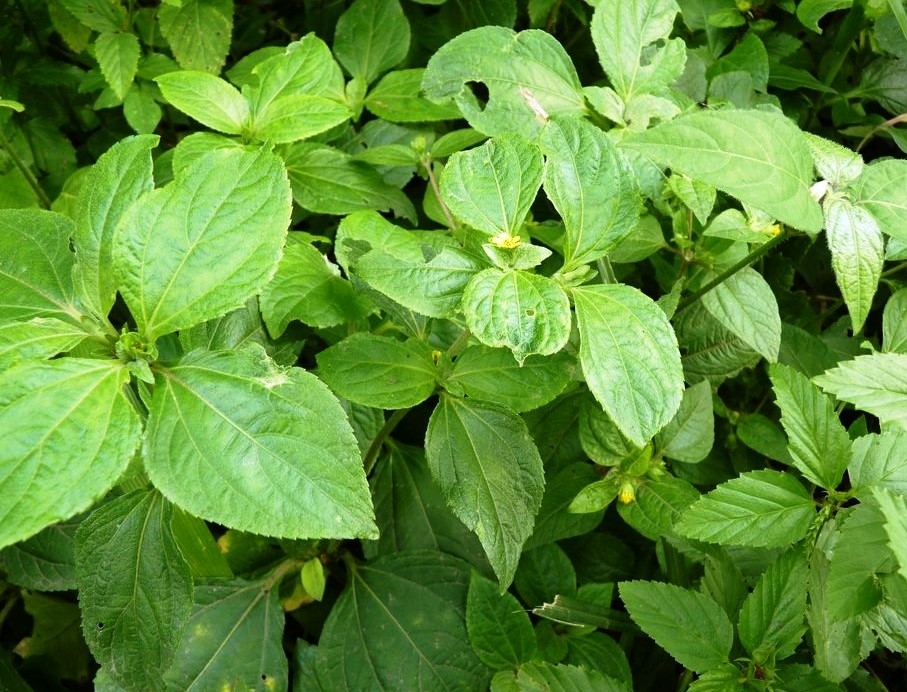Synedrella nodiflora

|
|
Synedrella nodiflora Common Names: Synedrella, Cinderella weed, nodeweed,
pig grass Scientific
Classification Kingdom: Plantae Clade: Tracheophytes Clade: Angiosperms Order: Asterales Family: Asteraceae Genus: Synedrella Species: S. nodiflora Binomial Name: Synedrella nodiflora (L.) Gaertn. Synonyms: Blainvillea latifolia var. latifolia, Ucacou nodiflorum (L.) Hitchc., Verbesina nodiflora L., Wedelia cryptocephala Peter Morphological Description Synedrella nodiflora, commonly referred to as Cinderella weed or nodeweed, is an
annual or short-lived perennial herb that typically grows to heights of 30–100
cm, occasionally reaching 150 cm in fertile soils (Kew Science, 2024). The
stems are erect to procumbent, dichotomously branched, and covered with short,
rough hairs, giving a slightly prickly texture. Leaves are simple, opposite,
elliptic to ovate, 3–12 cm long and 1–5 cm wide, with finely toothed margins, a
glossy upper surface, and a pubescent underside (Tropical Plants Database,
2024). The plant produces small, yellow flower heads, 5–10 mm in diameter,
arranged in axillary and terminal clusters, each containing 10–20 tubular
florets with 3–5 ray florets, blooming year-round in tropical climates (Adams,
1972). Fruits are achenes, 3–4 mm long, flattened, with a bristly pappus aiding
wind dispersal (CABI, 2024). Distribution and Habitat Native to tropical and
subtropical Americas, from southern Mexico through Central America to northern
South America and the Caribbean, Synedrella nodiflora has become widely naturalized in West
Africa (e.g., Nigeria, Ghana), Southeast Asia (e.g., Malaysia, Philippines),
northern Australia, and Pacific islands like Hawaii (Kew Science, 2024; CABI,
2024). It thrives in disturbed areas such as farmlands, roadsides, waste
grounds, and pastures, often becoming a weed in banana, yam, and maize
plantations (Tropical Plants Database, 2024). The species prefers seasonally
dry tropical biomes, adapting to a range of soils sandy, loamy, or clay with a
pH of 5.0–7.5, and grows optimally in warm, humid conditions with annual
rainfall of 800–2,000 mm and temperatures of 20–32°C, at elevations up to 1,500
meters (Hutchinson & Dalziel, 1958). Ethnopharmacology Synedrella nodiflora is a significant plant in traditional medicine across its
native and naturalized ranges, attributed to its bioactive compounds, including
flavonoids, alkaloids, tannins, and terpenoids (Chaniad et al., 2021). Below
are key ethnopharmacological uses supported by research: · Antimalarial Activity: In Nigeria, whole-plant decoctions treat
malaria; ethanolic extracts (200–400 mg/kg) suppressed Plasmodium berghei parasitemia by 65–80% in mice, comparable
to chloroquine, due to flavonoids and phenolic acids (Chaniad et al., 2021). · Anti-inflammatory and Analgesic: In Ghana, leaf poultices relieve fever and
pain; methanol extracts reduced carrageenan-induced paw edema in rats by 50% at
300 mg/kg, linked to anti-inflammatory terpenoids (Agyare et al., 2013). · Antimicrobial Properties: In the Philippines, juice from crushed
leaves treats infections and wounds; The ethanol extract demonstrated
significant antibacterial activity against multiple bacterial strains (Wijaya
et al., 2011). · General Tonic: In Benin, infusions are used as a health tonic. These applications
highlight its phytochemical diversity, with over 30 compounds identified,
enhancing its therapeutic potential (Chaniad et al., 2021). ⚠ Toxicity Profile: Acute toxicity studies indicate Synedrella nodiflora is safe at traditional doses, with no
mortality in rats at 2,000 mg/kg of ethanolic extract, though mild sedation was
observed at higher doses (Chaniad et al., 2021). Additional Uses · Fodder and Nutrition: Leaves, with 2–4% protein and 10–20 mg/100
g vitamin C, are used as fodder for goats and cattle in Nigeria and as a minor
vegetable in soups (Adelakun et al., 2014). · Ornamental Value: Its yellow flowers and adaptability make
it a minor ornamental in tropical gardens, attracting pollinators like bees
(Tropical Plants Database, 2024). · Ecological Role: It acts as a pioneer species in disturbed
areas, stabilizing soil and supporting biodiversity, though its weed status can
challenge crops (CABI, 2024). References
External Links More Pictures |
|
| Compounds of Synedrella nodiflora |
|
| References |